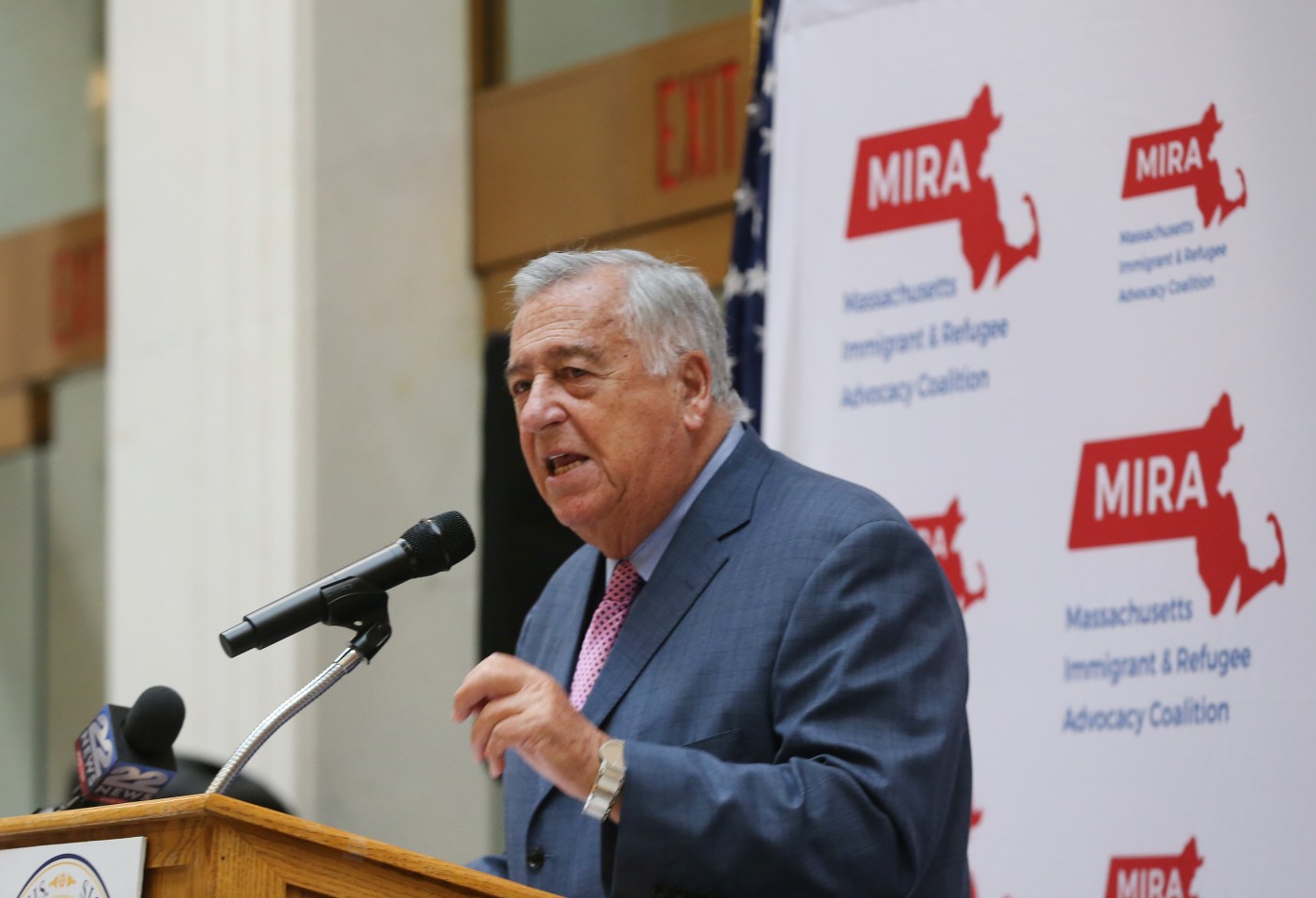
Budget cuts on the table amid runaway migrant costs, Speaker says
House Speaker Ron Mariano suggested Thursday that broad budget cuts could be on the table when lawmakers sit down next year to draft the fiscal year 2026 budget, painting a grim financial picture for Massachusetts fueled by the historically high cost of running state-run shelters.
An influx of migrants from other countries and the crushing costs of living in Massachusetts have pushed people to seek assistance from emergency shelters at record levels. The state is required to run the shelter program because of a decades-old right-to-shelter law.
But with an expected $932 million tab this fiscal year and $915 million in the next to maintain shelters, associated services, and keep municipal reimbursements on track, Mariano projected that a range of other programs could be on the chopping block.
“Every program that we fund is susceptible to being tapped to fund the shelter program. Not in this budget but in the next because there will be no help coming. There’s no help coming. The federal government can’t get its act together,” he told reporters. “They couldn’t even agree on a vote to shut down the border.”
Emergency shelters in Massachusetts have remained at a 7,500-family cap Gov. Maura Healey imposed in the fall. Legislative budget writers said this month that it costs the state roughly $75 million a month to care for those families with children and pregnant people temporarily living in a sweeping network of hotels, motels, and traditional shelter sites.
The exorbitant cost of the system has started to weigh heavily on Beacon Hill amid a consistent return of lower-than-expected tax revenues. The House, Senate, and Healey have proposed limiting families’ stays at shelters and overflow sites in an attempt to curb demand and costs.
“If we keep getting a billion-dollar bill for emergency shelters, where are we going to get the money?” Mariano said. “There has to be some realities that people put forth so that there’s some understanding that cuts will have to come. And it’s not something that I look forward to and I’m not going to spring it on people at the last minute and say hey, ‘we just whacked your budget.’ People have to understand how we get to this.”
Budget writers expect to run out of money to pay for the emergency assistance shelter program this fiscal year in early to mid-April, and two top Democrats are hashing out a plan to pay for services for the rest of the fiscal year and potentially into the next.
Questions about fiscal year 2026 have been lingering in the hallways of the State House, especially if demand for emergency shelters does not slow down.
Mariano said Beacon Hill will manage to fund services in fiscal years 2024 and 2025 because of surplus revenues left over from the pandemic.
But once those funds are tapped, and if Congress continues to find itself stalled over immigration aid, Massachusetts could find itself in a difficult spot in fiscal year 2026, the Quincy Democrat said.
Everything is “on the table” come next year, he said.
“Good times are great. And when there were good times, everyone really enjoyed spending the money. And I enjoyed spending the money. But I’ve been through bad times in here when local aid has been cut, when everything in the budget has been on the table for a cut. When you cut local aid, you’re really pretty much at the bottom of the budget,” he said.
Mariano spoke at the Massachusetts Immigrant and Refugee Advocacy Coalition’s annual “Immigrants’ Day” at the State House, where he told the large crowd that next year “is going to be extremely difficult.”
“It will be extremely difficult for us as legislators and extremely difficult for you as advocacy groups. There is no money coming from the federal government. They are in such a disarray. We can’t count on their help at all,” he said. “We’re going to have to do it on our own. And we’re all going to have to tighten our belts and do the best we can to make sure that the programs that are important are funded adequately.”
MIRA Coalition Executive Director Elizabeth Sweet said it is no surprise to hear Mariano say the federal government is not sending help.
“We also see the reality and his comments are not a surprise in that sense. But I remain optimistic that we are in some agreement that some of this programming is critical to Massachusetts and to the Massachusetts economy, that we continue to welcome immigrants here,” Sweet told the Herald at the State House.
Massachusetts Coalition for the Homeless Associate Director Kelly Turley said she is “obviously” concerned about the state’s financial situation.
“We want to make sure that the current housing crisis and homelessness crisis don’t lead to families and individuals who need services not being able to access them, whether that’s shelter, housing, wraparound supports,” she said after listening to Mariano speak. “We encourage the state to make the investments in homelessness prevention so that the state doesn’t have the higher price tag of long-term shelter stays.”


